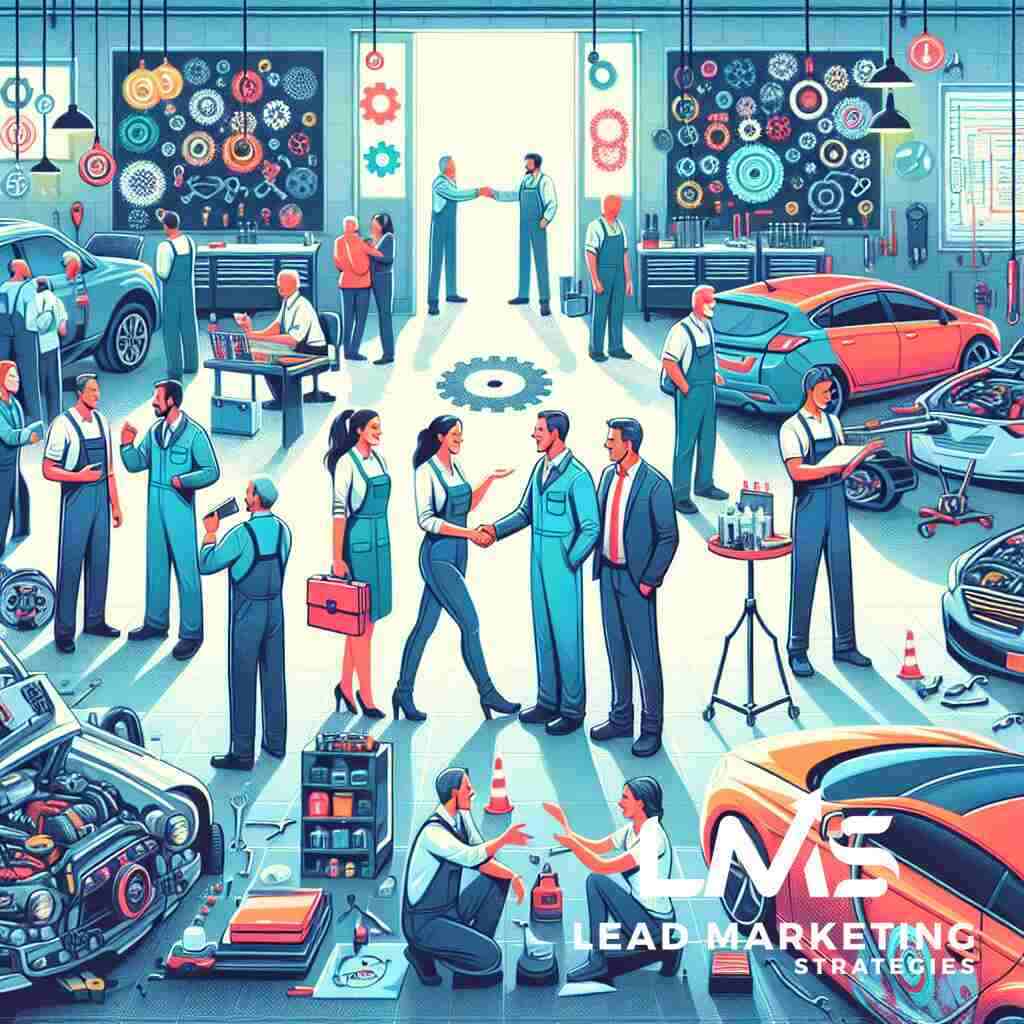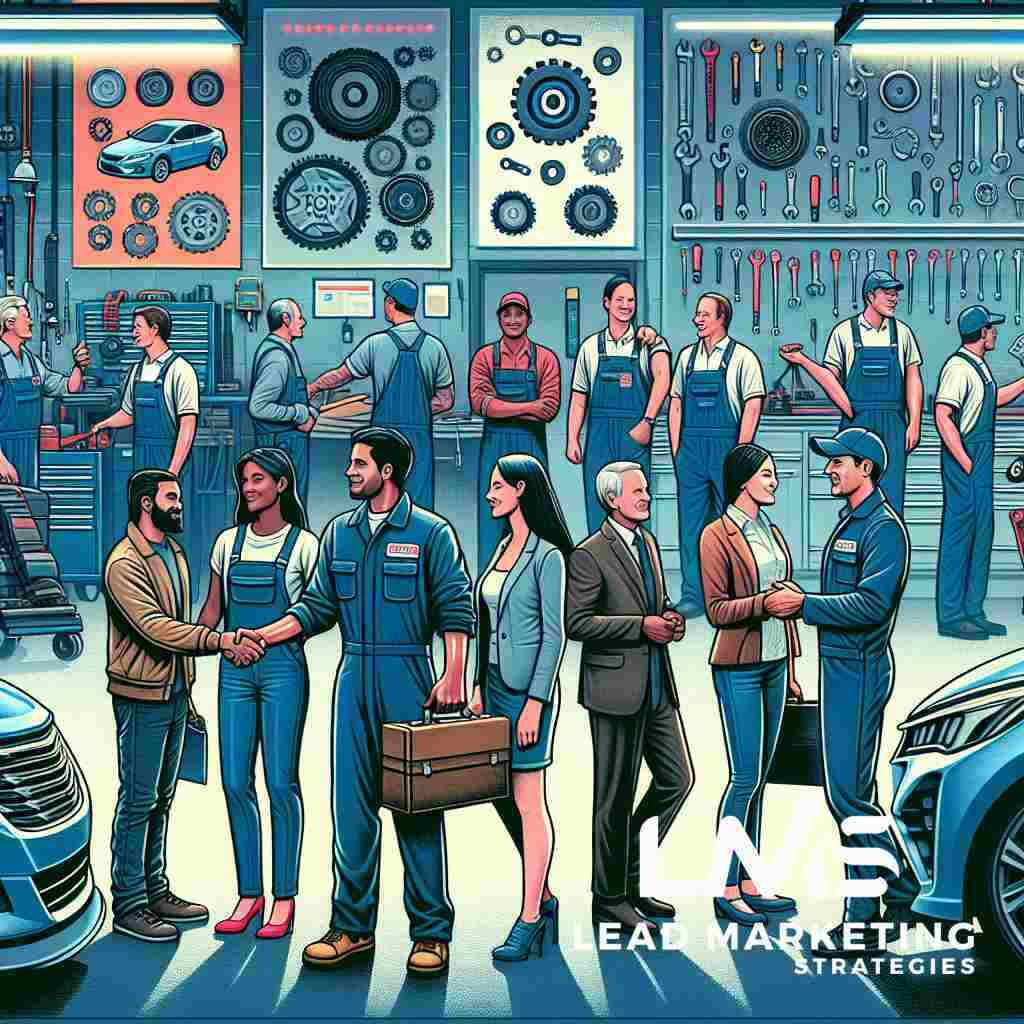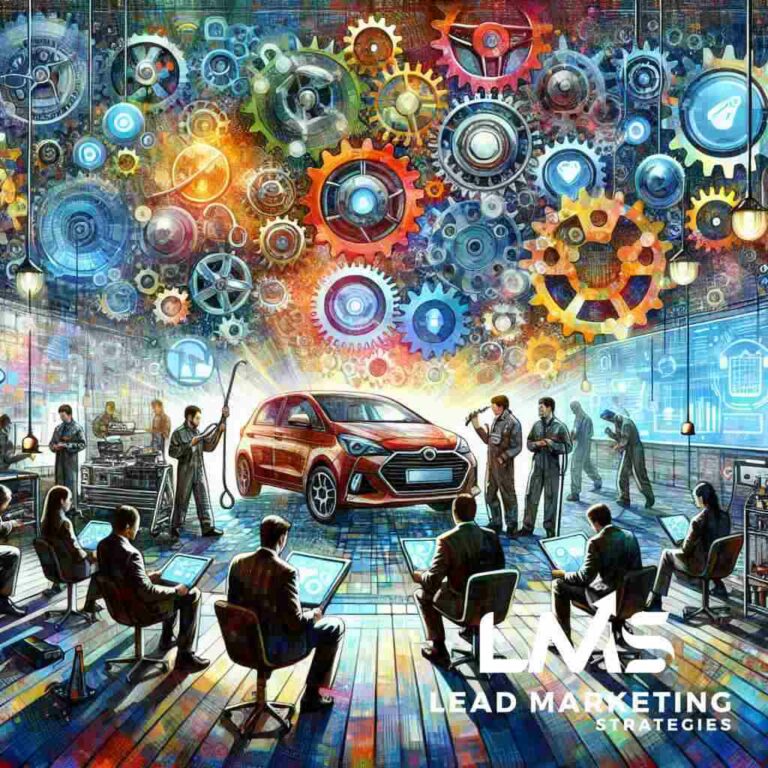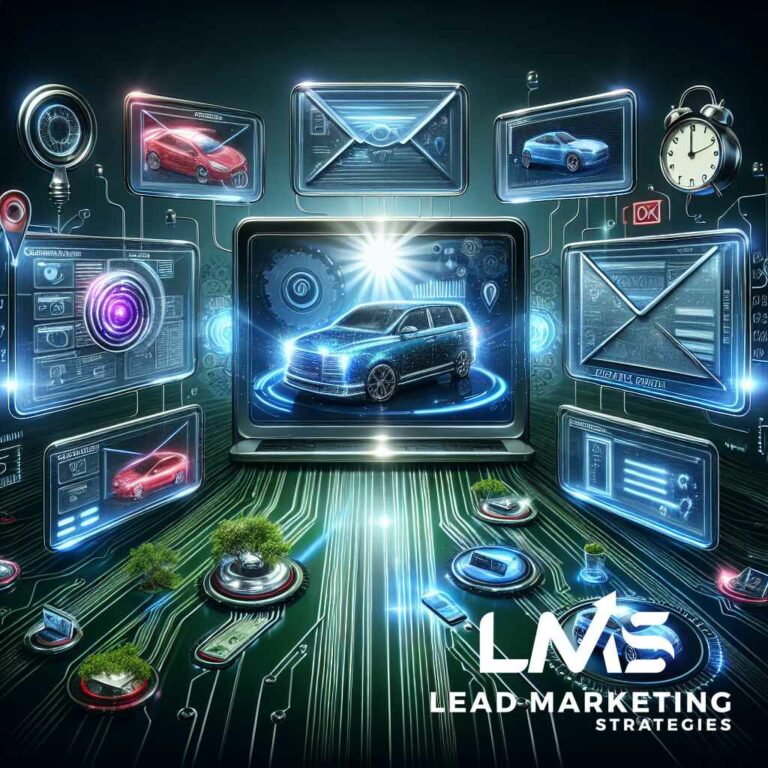Revolutionizing Auto Shop Customer Loyalty
Understanding Automotive Customer Needs
The automotive industry thrives on understanding the unique needs of each vehicle owner. By identifying the specific requirements and preferences of customers, auto shops can tailor services to meet these expectations, consequently enhancing the overall auto shop customer experience. Comprehensive market research and customer feedback polls are instrumental in recognizing what customers prioritize, be it quick service, transparent dealings, or value-driven offers. Businesses need to delve deep into the psyche of the automotive clientele, recognizing nuances in customer behaviors and expectations. This strategic insight not only fosters satisfaction but propels repeat business.
Personalization plays a pivotal role here; it is not just about having the right tools but about using them effectively to offer personalized car repair services. This level of personalization demonstrates a proactive understanding of customer preferences and technological insights into vehicle diagnostics. It is this attention to detail and individualized service that strengthens long-term relationships and commits customers to one specific auto shop over others. Indeed, ensuring vehicle service satisfaction turns casual customers into devoted advocates.
Building Trust in Auto Repair Services
Establishing trust with customers is imperative for any automotive service provider. Transparency, open communication, and consistently high-quality service lay the foundation for trust-building with auto services clients. Providing clear explanations of repair needs, costs, and anticipated outcomes helps demystify processes for clients and eliminates suspicions of overcharging or unnecessary repairs. Encouraging an environment where customers feel valued and understood ensures they perceive the auto shop as a partner rather than just a service provider.
One effective way to build trust is through loyalty programs for auto mechanics. These initiatives not only reward repeat visits but promote continuous engagement, enhancing the customer’s sense of being part of a community. Trust-building can also be accelerated by consistently delivering top-notch customer service and showcasing certifications or testimonials from satisfied clients. Moreover, leveraging authentic client reviews and fostering a platform wherein customers can share their positive experiences nurtures both transparency and faith in the services rendered.
Proactive Communication in Car Services
Effective, proactive automotive customer communication can significantly impact customer retention in auto shops. Keeping clients informed at every stage of a repair or maintenance process not only demonstrates professionalism but also aligns with customer expectations for updates. Establishing channels for two-way communication, like social media platforms or dedicated apps, allows auto services to swiftly address concerns, share service updates, and receive real-time customer feedback.
Proactive communication is also about anticipating customer needs through data-driven insights and timely reminders. Automated service reminders for regular maintenance or state inspections, for instance, underscore a forward-thinking approach that genuinely cares for client vehicles. Clear and consistent communication reinforces customer engagement, ensuring that clients feel appreciated and well-informed. By adopting cutting-edge communication strategies that resonate with modern vehicle owners, auto shops can solidify strong customer relationships that stand the test of time.
Crafting Exceptional Auto Shop Experiences
Personalized Car Repair Services
Personalized car repair services are the cornerstone of exceptional auto shop experiences. By understanding the unique preferences and driving habits of each vehicle owner, auto shops can tailor their services to address specific needs. This attention to detail enhances the auto shop customer experience and solidifies long-term customer loyalty. Implementing data-driven insights allows shops to predict necessary services, thereby optimizing both vehicle performance and customer satisfaction. The era of one-size-fits-all service is over; today’s consumers expect customized solutions that reflect their individual priorities.
Effective personalization in automotive services is achieved through comprehensive vehicle assessments and direct consumer interactions. Mechanics must leverage technology to maintain meticulous service records, ensuring client preferences are accurately recorded and addressed. Moreover, personalized recommendations foster a deeper connection with customers, exemplifying an auto shop’s commitment to individual care. As the automotive market becomes increasingly competitive, shops that invest in creating a personalized customer journey will distinguish themselves as leaders in auto shop branding strategies.
Responsive Customer Service for Auto Shops
Responsive customer service for auto shops is not merely about answering calls promptly but about crafting a holistic support system that addresses customer needs eagerly and effectively. A customer-centric approach imbues every interaction with a sense of urgency and professionalism, reassuring clients that their concerns are paramount. Establishing a streamlined service channel, such as a dedicated hotline or app-based communication, enables auto shops to swiftly manage inquiries and service requests. By providing responsive customer service in auto repair, businesses ensure their customers feel heard and valued.
An adaptive customer service model anticipates potential challenges and maintains a proactive stance in resolving client issues. Training staff to be knowledgeable and empathetic enhances problem-solving capabilities and fortifies client trust. Moreover, fostering a feedback-driven culture allows auto shops to continuously refine their service strategies, ensuring they remain aligned with evolving customer expectations. In the vast domain of automotive services, responsive customer service is a powerful differentiator that builds steadfast client relationships and elevates the overall brand image.
After-service Follow-up for Auto Shops
After-service follow-up for auto shops is a critical element in nurturing perceived customer loyalty and satisfaction. It signifies a commitment to excellence, extending the relationship beyond the transaction and transforming a one-time visitor into a repeat client. Implementing after-service follow-up strategies enables shops to solicit feedback, highlight areas of improvement, and reinforce the value placed on customer opinions.
Through personalized emails or surveys, auto shops can gain valuable insights and initiate meaningful dialogue with patrons. This ongoing communication not only fortifies the client-provider relationship but also creates opportunities to introduce additional services or promotions. The after-service phase is crucial for measuring customer experience and identifying potential gaps in service delivery. By investing in well-structured follow-ups, auto services can address any concerns proactively and cultivate an environment of trust and transparency, essential elements in the fierce realm of auto shop customer relationships.

Innovative Strategies for Retaining Auto Shop Customers
Loyalty Programs for Auto Mechanics
Loyalty programs have become a staple in the auto repair industry, offering significant advantages for both businesses and vehicle owners. By implementing structured loyalty programs for auto mechanics, auto shops can foster repeat business and elevate customer retention rates. These programs typically reward customers with discounts, free services, or special promotions in exchange for their continued patronage. Not only do these rewards incentivize repeat visits, but they also enhance customer satisfaction in auto services, making clients feel valued and appreciated.
Moreover, loyalty programs serve as a powerful marketing tool, differentiating a shop from its competitors. By creating exclusive offers tailored to customer preferences, auto shops can ensure clients remain loyal rather than seeking services elsewhere. Such programs also provide valuable data on customer behaviors and preferences, enabling businesses to fine-tune their marketing strategies in Long Island and beyond. Ultimately, a well-crafted loyalty program reflects a shop’s commitment to long-term customer relationships, a key driver of business success.
Automotive Customer Feedback and Insights
Gaining insights through automotive customer feedback is crucial for auto shops looking to optimize their services. Feedback mechanisms, such as surveys and direct communication channels, allow businesses to understand customer needs and identify areas needing improvement. By actively seeking customer opinions, auto shops demonstrate a proactive approach to service enhancement, directly contributing to better retention rates.
The insights gathered from customer feedback can drive significant improvements in service delivery and customer engagement strategies. By leveraging this invaluable data, automotive businesses can create more refined marketing strategies, address issues promptly, and anticipate client needs. This approach not only reinforces trust but also enhances the overall auto shop customer experience. Feedback is more than just a tool for problem-solving; it’s a bridge that connects businesses with their clientele, allowing for continuous growth and adaptation in the competitive automotive sector.
Enhancing Auto Shop Customer Experience
Enhancing the auto shop customer experience is vital in fostering lasting relationships and driving customer retention. This involves creating a seamless, enjoyable, and informative service journey that meets and exceeds client expectations. By focusing on proactive communication in car services, auto shops can ensure customers are informed and engaged throughout their service experience.
Innovative strategies, such as personalized care plans and interactive communication platforms, can significantly enhance customer interaction. These efforts should be complemented by robust support channels, ensuring customers have easy access to assistance whenever needed. Moreover, staff training in customer care plays a critical role in maintaining high service standards, as knowledgeable and empathetic employees are better equipped to address client concerns and deliver exceptional service.
Ultimately, the goal is to create an auto shop environment that exudes professionalism and care, reinforcing the brand’s reputation and customer loyalty. This dedication to customer-centric service not only boosts satisfaction but also positions an auto shop as a leader in quality assurance in auto repairs, thus securing its place in the hearts of its patrons and within the competitive automotive industry.
Analyzing and Adapting to Automotive Customer Journeys
Automotive Retention Analytics
In the ever-evolving landscape of the automotive industry, retention analytics play a vital role in understanding and improving customer engagement near auto markets. By harnessing data-driven insights, auto shops can identify patterns in customer behaviors, predict trends, and tailor services to meet evolving expectations. Advanced analytics tools allow automotive businesses to dissect customer interactions comprehensively, highlighting areas for enhancement while capturing opportunities for upselling and cross-selling.
Moreover, through such detailed analysis, businesses can measure the impact of automotive marketing efforts, enabling them to allocate resources effectively and strategize future campaigns. Investing in robust retention analytics systems reveals the benefits of a data-centric approach, transforming statistics into actionable strategies. Consequently, auto shops that rigorously track and analyze retention metrics elevate their market positioning, showcasing an unparalleled understanding of client needs.
Vehicle Owner Relationship Management
Managing relationships with vehicle owners is paramount in maintaining customer loyalty in auto services. A successful vehicle owner relationship management strategy involves understanding client demographics, preferences, and historical data to foster long-term engagements. By leveraging this information, auto shops can deliver personalized communication plans, strengthen loyalty through targeted promotions, and ensure seamless interactions. Digital marketing strategies further aid in cultivating these relationships by providing the tools necessary for consistent engagement and outreach.
Focusing on relationship management transforms routine service visits into value-rich exchanges, empowering businesses to anticipate the needs of their patrons. Encouraging client feedback and acting on suggestions solidifies consumer trust, nucleating a community-centric ethos within the auto shop. It is in these reciprocal, sustained relationships where real competitive advantage is forged, inviting vehicle owners back less for necessity, and more for the shared value they feel in operations.
Quality Assurance in Auto Repairs
Quality assurance in auto repairs is indispensable for building and retaining customer trust. Ensuring top-tier repair quality not only minimizes return visits for unresolved issues but also enhances the overall auto shop image. Incorporating rigorous quality control measures throughout the repair process, such as employing certified technicians and maintaining up-to-date equipment, exemplifies dedication to excellence. This commitment to quality must extend beyond technical repairs to encompass comprehensive trust-building for auto services.
Establishing protocols for quality checks before service completions and encouraging transparent practices elevates customer confidence while underscoring the shop’s reliability. Additionally, periodic training for staff ensures that the latest innovations in automotive repair methodologies are applied, fostering an environment of continuous improvement. By proactively adhering to high-quality standards, auto shops not only replicate success across service tasks but also fortify their reputation as industry leaders in automotive care, driving unparalleled customer retention.

Concluding Thoughts on Auto Shop Customer Retention
The Future of Customer-centric Auto Services
The future of customer-centric auto services lies in the seamless integration of innovative technology with traditional service values. Auto shops must adapt to the clients’ evolving expectations, ensuring their services remain relevant and engaging. As branding in auto services continues to evolve, shops need to leverage these advancements to enhance the customer journey, from the initial contact to post-service follow-ups. By adopting state-of-the-art search engine optimization techniques, shops can guarantee enhanced visibility and accessibility in digital landscapes, capturing a broader clientele.
Embracing digital transformation will also propel the industry towards more personalized solutions, allowing auto services to cater to individual needs with unprecedented accuracy. Businesses must integrate robust data analytics to predict future service demands, ensuring they are prepared to meet customer needs with agility and efficiency. In this digital age, the relationship between auto shops and their clients will be strengthened by convenience and innovation, fostering loyalty that transcends generations.
Final Insights into Vehicle Service Satisfaction
Vehicle service satisfaction remains the cornerstone of customer retention in auto shops. Ensuring clients receive top-quality service is paramount in any business strategy aimed at fostering long-term relationships. Regularly seeking and incorporating automotive customer feedback is essential in maintaining high service standards and identifying areas for improvement. Feedback channels should be clear, accessible, and responsive, demonstrating a shop’s commitment to continual improvement and client care.
Moreover, transparent communication and effective trust-building mechanisms are non-negotiable elements in enhancing vehicle service satisfaction. By adopting these practices, businesses can create an atmosphere that encourages repeat patronage and referrals. Aligning services with customer expectations and pre-empting potential issues through proactive measures ultimately ensures a loyal client base Auto Shop Marketing Strategies. As the industry continues to evolve, the shops that prioritize customer satisfaction and build upon these foundational trust elements will emerge as leaders in the competitive automotive landscape.
In summary, by embracing change and integrating customer-centric practices, auto shops can anticipate a thriving future characterized by enduring relationships and sustained success. Auto Shop Marketing Strategies is ready to assist in this transformation, providing expert guidance and support to ensure your auto business remains at the forefront of customer satisfaction and retention.
Frequently Asked Questions
Question: How can personalized car repair services enhance the auto shop customer experience?
Answer: Personalized car repair services cater to the specific needs and preferences of vehicle owners, resulting in a tailored customer experience. By understanding each customer’s unique requirements, auto shops can offer customized solutions that align with individual driving habits and vehicle specifications. Leveraging data analytics allows businesses to anticipate and suggest services that boost vehicle performance and customer satisfaction. This personalized approach not only strengthens customer loyalty but also distinguishes auto shops as leaders in the competitive automotive market.
Question: What role does proactive communication play in customer retention for auto services?
Answer: Proactive communication in car services is crucial for retaining customers. By keeping clients informed throughout the repair or maintenance process, auto shops demonstrate professionalism and build trust. Establishing channels such as social media or dedicated apps facilitates timely updates and feedback collection. These communication strategies ensure clients feel valued and engaged, which is essential for fostering long-term relationships. When auto shops anticipate customer needs and maintain clear communication, they solidify their reputation for responsive customer service.
Question: How do loyalty programs for auto mechanics support retaining auto shop customers?
Answer: Loyalty programs for auto mechanics encourage repeat business by rewarding customers with discounts or special promotions. These programs reinforce a sense of value and appreciation, motivating clients to choose the same shop for future needs. Additionally, loyalty programs provide insights into consumer preferences, enabling auto shops to tailor offers further and enhance the overall client experience. Such initiatives not only boost retention rates but also serve as powerful marketing tools, keeping shops ahead of their competitors through customer-centric approaches.
Question: In the context of the blog title ‘What Is the Key to Customer Retention in Auto Shops,’ how does quality assurance influence customer loyalty?
Answer: Quality assurance in auto repairs is integral to building and maintaining customer loyalty. By implementing rigorous quality controls, employing certified technicians, and using state-of-the-art equipment, auto shops deliver reliable and consistent services. Ensuring repair excellence minimizes repeat issues and establishes trust with clients who rely on the shop’s expertise. High-quality assurance practices strengthen the brand’s image, encouraging loyalty and referrals, crucial elements in retaining customers in the competitive auto service industry.
Question: What is the importance of after-service follow-up for auto shops in enhancing customer satisfaction?
Answer: After-service follow-up is a vital component in nurturing customer loyalty and satisfaction. It signifies an ongoing commitment to excellence beyond the initial transaction, transforming occasional visitors into repeat clients. By soliciting feedback through personalized emails or surveys, auto shops can gain actionable insights that inform service improvements. This dialogue enhances the client-provider relationship and opens opportunities for introducing additional services or promotions. Effective follow-up demonstrates a shop’s dedication to transparency and quality, reinforcing its role as a trusted service provider in the automotive industry.




